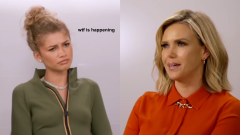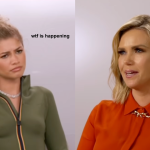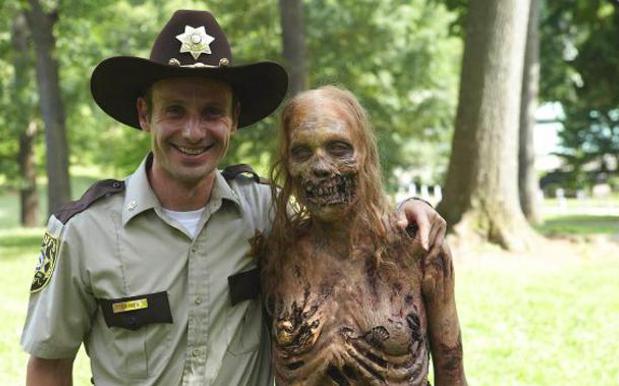
When it comes to “AMC‘s – The Walking Dead,” Heather Havrilesky of Salon.com said it best when she typed “a film-quality drama series about zombies? Somebody pinch me!” Fans rejoiced upon hearing a pilot was going to be made based on the much frothed over comic book series of the same name. Since then, it has gone on to become a critic favourite, ‘the most-watched basic cable drama telecast in history’ and just one heck of a show.
Coming up to the release of the second half of the third season we had a delightful chat with showrunner (for Seasons 2 + 3) Glen Mazzara about all things dead and walking.
How far before shooting do you know how the season is going to end. Is the plotting something that is concrete before you even start filming or is it something you feel your way through?
That’s a great question. There’s seven writers, including me, and we come together and spend about four weeks talking about the season in general and really figuring out the first half of it in detail. Then people go off and they write the first eight episodes (we sort of do two half seasons) so once we start shooting all of those first eight scripts are written and we’ll have a good idea of where the finale is going to end up. Then we push into figuring out the back half, which we would have ideas for but obviously wouldn’t have figured out in as much detail as the first eight, and at the same time we’ll be producing the show, sending writers to the set and all of that.
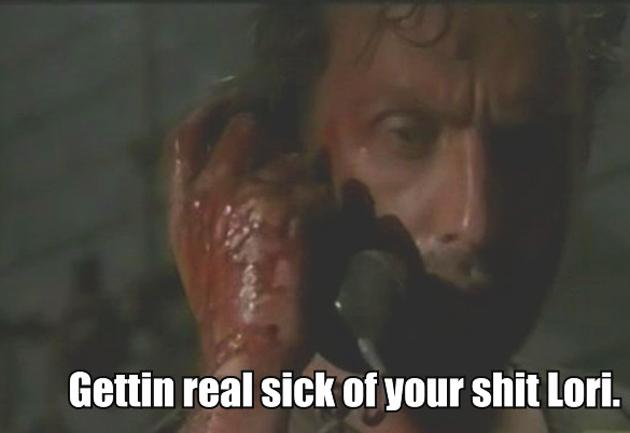
Always.
How much of that is informed by the comic itself and how much do you want to create an original story that may even surprise people who are familiar with that source material?
We end up using the comic as guide posts and there will be certain elements in the comic that we end up making sure to work into the show. Certain characters like Michonne, The Governor or the settings of Woodbury (Governor’s town) and the prison, for example. Those were things that were very well established in the comic, but the events of how our audience and characters encounter those new elements was original to the show. So we take the pieces and then try to make sense of them in our world. Robert Kirkman [writer of The Walking Dead comic book series] is one of the writers in the writer’s room and really does encourage us to tell a different story and break away from the comic in a way that will surprise the comic book fans.
We’re not a straight adaptation, we want all of our audience to be surprised every week.
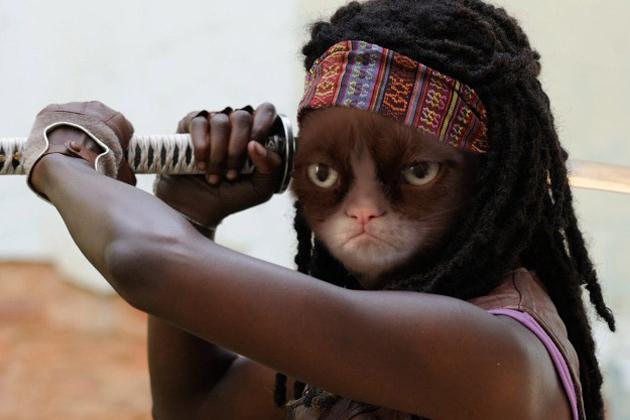
Michonne Sauce.
Season 3 has been a bit of a return to the story line of the comics, is Season 4 going to follow along the same track? And what can we expect?
We are very very happy with our finale and are setting things up for Season 4 but to be honest we will need to bring the writers together to fully developed Season 4 so it’s a little premature for me to get into that now.
(Laughs) I’m just kind of looking for a soft bed for the winter before I start dealing with Season 4.
When you’re breaking the season down and blocking everything out how do you intrinsically know when something will work and translate from script to screen to audience? Anything that you’ve identified that means it is going to work?
I think you trust your instinct. As storytellers it really starts with the writers and it’s about what satisfies us, what makes us happy and what we think is cool. This show has a tremendous fan base and a very vocal online community so we’re very mindful of the feedback and really love hearing from our audience, but we don’t try to write what we think might satisfy that audience. There’s so many varied viewpoints so we really try to concentrate on telling a story that we enjoy and we challenge each other.
Everybody offers and I try to run a very collaborative environment where everyone can improve and build on each others story. The story, in a way, just kind of shapes itself and everybody contributes in a meaningful way. That being said we do take chances, there have been things that we’ve thought were going to work and then it just doesn’t. So then you have to figure out if you need to write a new scene, pick up a shot or whatever. We’ve also had stuff that we weren’t sure about and then have been pleasantly surprised when it really lands. I think it’s just always a matter of taking the risk and trying to trust ourselves as storytellers and so it’s really about the seven people around a table – that’s the first audience.
The show is insanely popular in America and abroad, what do you think it is about this kind of genre series that can become so popular when in the past they have been kind of relegated to the margins in TV Executive’s minds? We’ve seen Games of Thrones, True Blood even and these kind of genre series actually becoming really popular. Why do you think that is when conventional wisdom would say that they would gather more of a niche audience?
Well, I think it’s a few things, one is that these worlds on TV feel authentic. The level of craft in film making right now and the quality of the special effects is so great that the film making on TV has really come up to a very high standard. If you think of what used to be genre shows in the past the special effects sometimes felt cheap or cheesy, I’m talking ages ago, and if you think of how things have improved and what you’re able to do on a weekly basis the shows feel like events.
Secondly, these shows are populated with a large ensemble, different locations and it comes to feel like a whole world. I’ve been very impressed with the way the audience wants to know what’s happening in all the corners of our fictional world. If a character leaves the story for example people want to know where they went and what’s happening with them. Where are they now? There’s a certain amount of people buying into these worlds; in the same way that they do in the Star Wars universe, or the Star Trek universe, or Lord of the Rings. It’s a total package and not just this little particular area as when you’re doing a more traditional television show, a police precinct for example. Or just this particular ER. You feel like there’s a whole geography around these worlds.
And I think because of the calibre of talent that is being drawn to some of the shows, you really feel like these characters are accessible and real. I just think that there has been a lot of great writing, a lot of terrific acting and directing, and they’re just fun to make.
So it’s a talent draw, and that really shows.
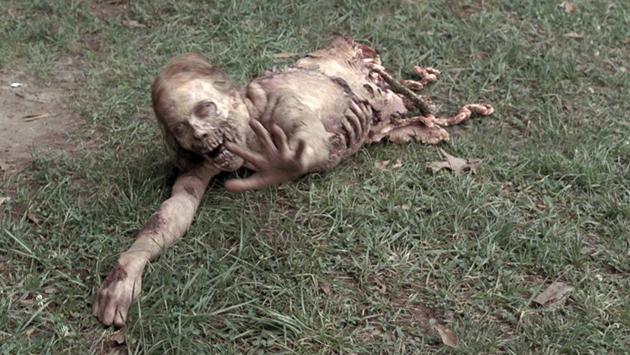
Mi scusi?
You’ve kind of had time to settle into this role now since the change over from Frank [Darabont], what have been the biggest surprises, challenges and rewards for you sitting in the hot seat now?
With the rewards, I do think it’s connecting with such an overwhelmingly passionate fan base. That’s been exciting and has been a surprise. You work on a tv show, and I’ll be honest, this feels like the first TV show I’m working on that anybody is watching. Certainly in these numbers, and this is a show that people are talking about, that they’re interested in and that they have questions about.
When the show premieres each week I just watch the twitter feed for an hour because you get a real time feedback and you can see that people like that joke, or they didn’t like it. Or maybe you realise that it was confusing and we probably should have written that scene differently. It’s immediate reactions that have been interesting.
The challenges are – it’s a big complicated show. We have a lot of different characters and it’s hard to service all of those characters. There may be certain elements that the audience want to know more about and maybe we haven’t invested the time in because we’ve been focused on other things. It’s been very interesting to think about all the different things that we’re working, on trying to deliver every week, especially given that within a lot of the audience there’s such an appetite. They’ll say ‘well what about this?’ and we’ll say ‘okay we’re getting to it’ or ‘ugh, we don’t have time to get everything in.’ It’s been fun though, it’s been really fun.
I guess another consideration for you guys is, as with police procedurals, balancing that action/gore element with character development and the interpersonal relationships that keep people coming back. How do you give attention and love to both sides of why people are watching your show?
I have a particular take on what I think is the type of storytelling that I think is right for this show and I feel that it needs to be about people making choices and that’s how we reveal characters. So you don’t necessarily have characters standing around spouting their philosophy or discussing things in a philosophical way. What I want to do is put tremendous pressure on these characters, put them in a story and incredible situation that has no known options or good outcomes, and then see the choices that they make. That’s what has been driving the story forward and complicating things. Plus, when we have so many fantastic characters that you can write to, who can all makes choices, you can develop a story with certain characters, and then they makes choices and like a billiard ball that story then crashes into and effects these characters, and then that crashes into those other characters and everything is interrelated.
That’s been the way that we’ve been trying to do it, which gives you a good marriage of revealing character and also driving story. This is not a show that’s about revelation, it’s not about solving a mystery every week. It’s about people in a situation trying to figure out how to survive. So it’s very high stakes and if you look at what they’re doing they’re really not looking for a cure. There is no cure to be had for this zombie virus so there’s no solving the riddle and getting back to life.
It’s about rebuilding civilization after this apocalypse.
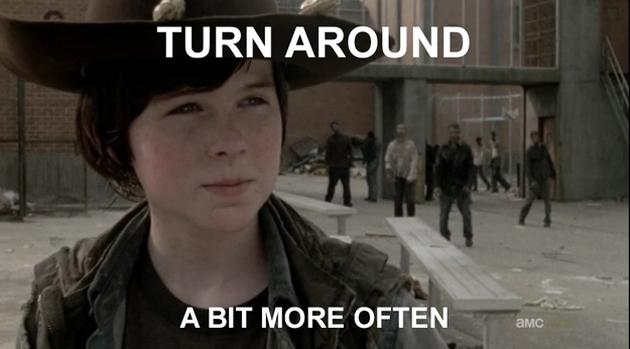
4 srs, Karl!
It’s not LOST basically, there’s no one higher thing driving it.
Yeah, I mean LOST is incredibly well done, that’s just a different model for a show and we’re not using that model.
What have been your favourite tv shows of 2012?
I absolutely love Breaking Bad. I’m a fan of Sons of Anarchy – my friend Kurt Sutter writes that and it’s always great to watch. I’m a big fan of Games of Thrones and then I tend to watch a lot of comedies I enjoy Veep, Girls, Louie of course, It’s Always Sunny in Philadelphia, Archer those kind of shows. Children’s Hospital, I’m a big fan of that; when I get home at the end of the day I tend to put on a comedy but when I am sitting down to binge-watch on DVD’s or stream or whatever it’s really been Game of Thrones or Breaking Bad.
A lot of actors on the show are relatively new to TV, was that a conscious decision when casting to include fresher faces?
Well some of the show, the core ensemble, was cast before I joined the show. I wrote a script Season 1 and then I joined season 2 but I was involved in casting Scott Wilson and Lauren Cohan and certainly Danai [Gurira] and David Morrissey. I think the idea there was really just to find people who were going to fulfill those roles.
We had very particular ideas of who those characters were and all of those people auditioned and won it based on the strength of how they approached the material. This was not a show where we approached big stars and then wrote a character for those stars, we wrote the material first and fortunately had incredibly talented people come in who were fans of the show and eventually signed on.
Then as they joined the show we worked together to develop the characters so I have a lot of input from the actors and they help find the voice. The Hershel character in particular, when Scott Wilson first started he had a different energy from say Jon Bernthal or Andy Lincoln, so we really put in the time to figure out ‘who is this character?’ based on Scott’s approach and then developed, I think, a really beloved character.
It’s a great process and we’re very blessed to have such great actors.
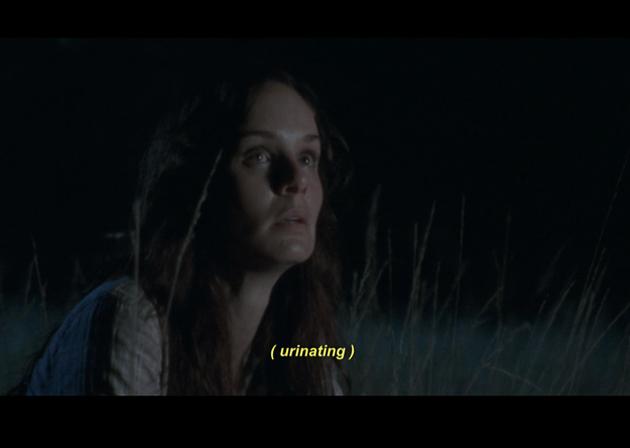
I wanted to know, with being a showrunner of such a massive production do you have any onset horror stories since you’ve started. Anything that you kind of wish someone else would come in and take care of the problem?
For me something that’s been difficult is that I’m the sole person who calls actors to tell them when their characters are being killed off. And that is not good. That is not ever fun. It is not ever pleasant. Most people are very professional about it, people are always surprised but they trust the writers to give their characters a send off. Sometimes those conversations don’t go well, sometimes people maybe take it personally with a bit of ‘what did I do wrong/why is this happening to me?!’ and we just have to explain that it’s the best story for the character and for the show. It’s never easy to put somebody out of work though, especially when everybody is doing a great job. We care about everyone so those calls are never easy.
So they’re something that I probably should say I wish somebody else could handle but it is my job to do and I take it seriously so I wouldn’t turn that over to anyone else.
But if I could never do it again, that would be great.
You’ll be in Australia to talk about writing for television and what it takes to succeed in the television industry, so over your years of experience what are three essential things that someone wanting to pitch a show to a network need, not only to be green lit but to succeed in front of an audience?
Bear with me while I think of an answer, I’ve never actually been asked that before.
Okay, you need a strong point of view for the audience, a strong character that drives the action. House, Tony Soprano, Jack Bower, Nurse Jackie etcetera. You need to have a strong central figure and that’s something that I think is important and part of what I’ve done on Walking Dead is push Rick Grimes front and centre. So I think that’s one thing.
Two is, I think it needs to feel accessible, plausible and believable to the audience. They are incredibly savvy and don’t want to feel cheated, they want to feel that if they are committing and investing their time and energy every week that it’s a good relationship. That they’re appreciated and are not being asked to buy into cheats or nonsense. They want to feel like it’s worth their time.
Even in a stylised world like Games of Thrones everything needs to be earned.
Exactly, people don’t want to feel like that it’s just been slapped together. They want to feel like the people who make the shows are putting as much care into as they are watching it, because they don’t have to watch it, there’s so much good material out there now that to get an audience is hard and they’re choosing you over someone else and they only have so much time.
The third thing is that it’s entertaining, believe it or not. It shouldn’t feel preachy or didactic or there should be something in there that makes it cool or stylish or fun or gives it a tremendous amount of heart.
So it needs to be plausible, follow it’s own rules to be heard, be entertaining, surprising and emotional satisfying to watch. I think there has to be some type of emotional resonance, if something is just sort of cold or off putting or feels like it’s talking down to the audience I don’t think the viewers are going to connect.

Thanks Glen!
If you haven’t already watched Walking Dead, do yourself a favour and GET INVOLVED:
If you’re up to date, get jacked up because it’s RETURNING FEBRUARY:
Glen Mazzara will be speaking as part of an upcoming screenwriter’s workshop The 2013 Television Writers Studio presented by Epiphany International Artists and featuring Jen Grisanti, former VP of Current Programming at NBC, Ellen Sandler, EP of ‘Everybody Loves Raymond’, Carole Kirschner, Director of WGA Showrunner Training Program and former VP of Television at Steven Spielberg’s Amblin Entertainment and Steve Kaplan, comedy consultant for writers at HBO, Disney, Screen Australia, NBC, Paramount and Dreamworks as well as Australian guest speakers Tony Ayres (ABC “The Slap’), Adam Zwar (ABC Lowdown/Wilfred) and Claudia Karvan (writer/producer of Love My Way and Spirited).
MELBOURNE
When: February 23 – 25, 9am – 6.15pm | evening sessions commence 7.00pm
Where: RMIT Storey Hall and The Wheeler Centre
SYDNEY
When: February 28 – March 2, 9am – 6.15pm | evening sessions commence 7.00pm
Where: Hoyts @ Fox and AFTRS Studios
Details: www.epiphany.com.au
